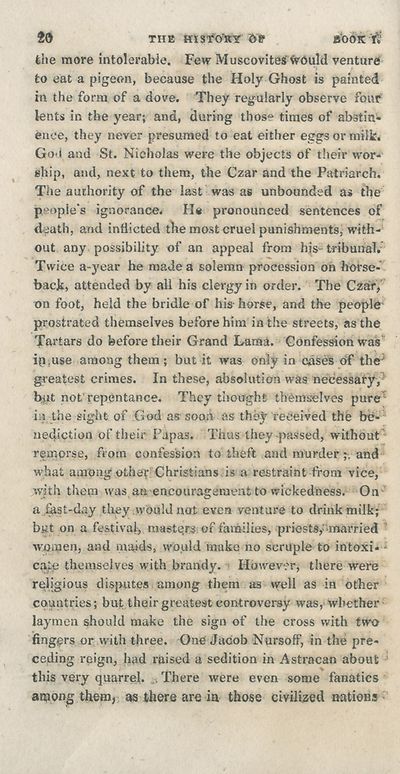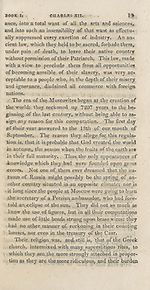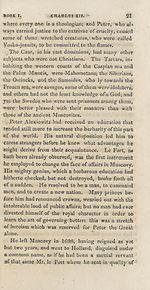Download files
Complete book:
Individual page:
Thumbnail gallery: Grid view | List view

20 THE HIS'fO'RY &«r BOOK t»
the more intolerable. Few Muscovites ^rOuld venture
to eat a pigeon, because the Holy Ghost is painted
in the form of a dove. They regularly observe four
lents in the year; and, during those times of abstin¬
ence, they never presumed to eat either eggs or milk.
Go t and St. Nicholas were the objects of their wor¬
ship, and, next to them, the Czar and the Patriarch.
The authority of the last was as unbounded as the
people’s ignorance. He pronounced sentences of
death, and inflicted the most cruel punishments, with¬
out any possibility of an appeal from his-tribunal.
Twice a-year he made a solemn procession on horse¬
back, attended by all his clergy in order. The Czar,
on foot, held the bridle of his horse, and the people-
prostrated themselves before him in the streets, as the
Tartars do before their Grand Lama. Confession was
ip,use among them; but it was only in cases of the'
greatest crimes. In these, absolution was necessary,
biit not' repentance. They thought themselves pure"
ia the sight: of God as sooii as they received thfe be¬
nediction of their Papas. Thus they passed, without’
remorse, from confession to theft and murder;, and
what among other Christians,is a restraint from vice,
with them was an encouragement to wickedness. On
a £ast-day they wduld not even venture to drink milk;
but on a festival^ masters of families, priest®,'married
women, and maids, would make no scruple to intoxi- •
catg themselves with brandy. However, there were
religious disputes among them as well as in other
countries; but their greatest controversy was, whether
laymen should make the sign of the cross with two
fingers or with three. One Jacob Nursoff, in the pre¬
ceding reign, had raised a sedition in Astracan about
this very quarrel. . There were even some fanatics
among them, as there are ia those civilized nations
the more intolerable. Few Muscovites ^rOuld venture
to eat a pigeon, because the Holy Ghost is painted
in the form of a dove. They regularly observe four
lents in the year; and, during those times of abstin¬
ence, they never presumed to eat either eggs or milk.
Go t and St. Nicholas were the objects of their wor¬
ship, and, next to them, the Czar and the Patriarch.
The authority of the last was as unbounded as the
people’s ignorance. He pronounced sentences of
death, and inflicted the most cruel punishments, with¬
out any possibility of an appeal from his-tribunal.
Twice a-year he made a solemn procession on horse¬
back, attended by all his clergy in order. The Czar,
on foot, held the bridle of his horse, and the people-
prostrated themselves before him in the streets, as the
Tartars do before their Grand Lama. Confession was
ip,use among them; but it was only in cases of the'
greatest crimes. In these, absolution was necessary,
biit not' repentance. They thought themselves pure"
ia the sight: of God as sooii as they received thfe be¬
nediction of their Papas. Thus they passed, without’
remorse, from confession to theft and murder;, and
what among other Christians,is a restraint from vice,
with them was an encouragement to wickedness. On
a £ast-day they wduld not even venture to drink milk;
but on a festival^ masters of families, priest®,'married
women, and maids, would make no scruple to intoxi- •
catg themselves with brandy. However, there were
religious disputes among them as well as in other
countries; but their greatest controversy was, whether
laymen should make the sign of the cross with two
fingers or with three. One Jacob Nursoff, in the pre¬
ceding reign, had raised a sedition in Astracan about
this very quarrel. . There were even some fanatics
among them, as there are ia those civilized nations
Set display mode to:
![]() Universal Viewer |
Universal Viewer | ![]() Mirador |
Large image | Transcription
Mirador |
Large image | Transcription
| Antiquarian books of Scotland > Kings & rulers > History of Charles XII, King of Sweden > (40) |
|---|
| Permanent URL | https://digital.nls.uk/115021490 |
|---|
| Description | Thousands of printed books from the Antiquarian Books of Scotland collection which dates from 1641 to the 1980s. The collection consists of 14,800 books which were published in Scotland or have a Scottish connection, e.g. through the author, printer or owner. Subjects covered include sport, education, diseases, adventure, occupations, Jacobites, politics and religion. Among the 29 languages represented are English, Gaelic, Italian, French, Russian and Swedish. |
|---|

